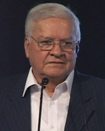New Media | 25 de marzo de 2011 | Vistas: 14
Matt Kibbe and Tristán Melendreras debate whether government debt is good for economic prosperity or not. Kibbe critics the institutionalized deficits and the government debt, and presents the argument that public finances should operate as normal finances, expressing that the tools that finance deficit spending are raising taxes, borrowing money and the expansion of money and credits; all of which affect economy prosperity. Tristán Melendreras, emphasizes that the State does not operate as a company, therefore does not have profits or losses. Melendreras focuses on the scientific nature of economics arguing that the scientific theory needs to be objective and historical. Finally, he points out that only a united society can solve the financial problems.


Matt Kibbe is president and CEO of FreedomWorks, previously known as…


Tristán Melendreras es catedrático en la Facultad de Ciencias Económicas de…
Nuestra misión es la enseñanza y difusión de los principios éticos, jurídicos y económicos de una sociedad de personas libres y responsables.
Universidad Francisco Marroquín